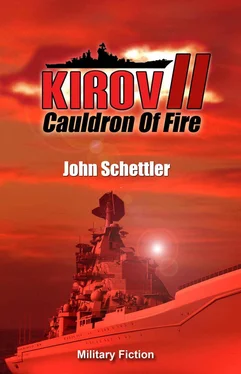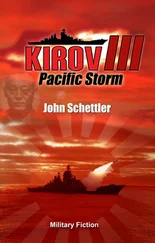Volsky scratched his head, looking from one to the other, and then came to a conclusion. “Well here we are at the eleventh hour, gentlemen. I have heard your analysis, and yet there is one other weapon we have not discussed that we might try using here.”
“Sir? I thought you did not wish to consider our nuclear option.”
“Oh, I considered it, Mister Karpov, and I have discarded it. The weapon I am thinking of now is intelligence. We have looked at two options here. The first has considerable risk. We make a run at this man, give him a shove as we go and hope to slip by him in the dark. It might work if our luck holds out. Now you suggest that we punch this man in the face first, and then threaten him with further harm if he does not stand aside. Yes, it is a strong tactic. Something our old friend Orlov might do. But I will propose another solution. Suppose we talk to this man before we punch him in the nose, eh? I think he might be more inclined to hear us.”
“Negotiate first? Before we’ve shown him what we can do to him if he persists?”
“Exactly. Mister Karpov, I believe he has already seen what we are capable of—weeks ago in the North Atlantic. He already knows we can hurt him before he even catches a glimpse of us. This is why he will position his ships to be within range from the moment we first exit the strait. Yes, he knows how dangerous we are. He knows we can hurt him severely, and yet here he comes. That is a different sort of bravery, is it not.” He glanced at Zolkin.
The Admiral’s eyes gleamed with a sudden inner fire. “I want to talk to this man—face to face. I want to look him in the eye and see if we can reach an understanding before any more men or ships die—on either side.”
He smiled, looking at the Doctor. “Dmitri, it has been a wonderful stay, but now I feel sufficiently recovered to re-assume my duties. Mister Fedorov, Mister Karpov, you have served well. I commend you both, but as of this moment I am formally re-assuming command of the ship. Fedorov will continue as Starpom , and you will remain on the bridge as Executive Tactical Officer, Karpov. Now, gentlemen. Let us get the ship in order and I will tell you what we are going to do.”
~ ~ ~
Aboard King George V the wireless operator got a most unusual message, just before sunset, and in plain English. It was directed to Admiral John Tovey, coming as a great surprise to him when he heard it. He listened to it carefully, repeating quietly over and over, and thinking about it as he listened. Considering the gravity of the situation, Tovey found it welcome. He had to hurry on if he was to get a good blocking position in the western approaches. He was nearly there, but all reports out of Gibraltar indicated the enemy was now in a very good location to make a run for the straits, heading south of the Rock, just outside the range of their shore batteries. These circumstances were going to see him arriving there just before sunset, a most unfavorable situation, with all his ships nicely silhouetted on the horizon.
When he finally caught up with Bismarck , he wisely elected to refuse battle at dusk and fight in the morning. If at all possible he wanted to fight at sunrise, with his enemy well silhouetted instead of his own ships. That may not matter to the enemy, he thought, but it would certainly help his own gunners. This message gave him just what he needed now—time—and he agreed to it at once, smiling at his flag officer of the watch.
“Get a message off immediately,” he said. “Send it in the clear.” He folded his arms.
“What shall we send, sir?”
“Las Palomas. Just that. Nothing more.”
The islandof Las Palomas is the southernmost point in all of Spain, poised at the edge of the Straits of Gibraltar and marking the boundary between the Atlantic Ocean and Mediterranean Sea. It dangles like a pendant from the Spanish mainland, a small heart-shaped spit of land no more than 1800 feet wide, with an equal length. Layers of history can be found there, from yawning caves where Paleolithic petroglyph drawings of horses grace the stony walls, to ruins of ancient Roman sites, and on through the centuries. Its strategic position at the entrance to the Straits of Gibraltar had seen it fortified by many empires. The nearby Spanish town of Tarifa just north of the island on the mainland was named after the Moorish general Tarif Ben Malik, who spearheaded the invasion in the year 711. Some said that the word “tariff” was derived from his name when the island became one of the first ports in the region to levy fees on ships seeking an anchorage. Remnants of castle walls and towers can still be found there, some built by the famous Abdul Ar Raman, a prominent Caliph of the Moors who invaded southern Europe until he was eventually stopped by Charles Martel at the Battle of Tours.
Given the island’s location, it had seen many desperate battles over the years. The Spanish fought to reclaim their land from the Moors for centuries, and the island had also been noted for a few famous last stands, one in the year 1292 when the Spanish Lord Guzman El Bueno was holed up in a fortress there and besieged by 5000 Moorish warriors. A treacherous rival, the Lord Don Juan had kidnapped Guzman’s son and thought to force his surrender with the threat of the boy’s execution. Yet stalwart to the end, Guzman refused, standing on the high walls and even throwing down his own knife so his antagonists might use it to kill his son.
In 1812 it was the British who joined the Spanish there to make a gallant defense against the invading Armies of Napoleon. Jean Francois Leval sent 15,000 French soldiers against Tarifa and was stopped by the tenacious defense of the 3000 man garrison. In the end the miserable and incessant rains had as much to do with the outcome of the battle as anything else. The French army slogged away, wet and beset with illness, leaving many of their siege guns stuck in the thickening mud. Now it would see warriors meet again, for a delicate negotiation on the razor’s edge of war.
Just after 17:00 hours on August 14, 1942 the ominous shadow of Kirov stretched in the wake of that imposing ship where it waited in the eastern approaches to the narrow Straits of Gibraltar. Her active sonar was pinging audibly, to make certain no undersea threat could come anywhere near them. Her radars rotated to scan the airspace all around them equally alert. To the northwest they could see the stark angles of the Rock itself, one of Great Britain’s most important and strategic bases in all the world.
A small motor craft had been launched from the ship, and it made its way under a flag of truce slowly through the straits toward the rocky eastern shore of Las Palomas. Admiral Volsky sat proudly in the center of the boat, flanked by five other men. They could have made a much more dramatic appearance by landing on the island with the KA-40, but Volsky had decided not to create a spectacle that would simply lead to more uncomfortable questions. The less these men knew about them, the better.
He knew, however, that what he was attempting now was dangerous, perhaps more dangerous than anything the ship itself had faced in these last few harrowing days. Soon the Admiral’s party made landfall and worked their way ashore. Now they stood beneath one of the old coastal ramparts, a beautiful castle ruin built in Neo-Renaissance fashion, smooth walls of amber sandstone with crenulated tops and styled parapets where the swarthy Moorish archers once stood their vigilant watch. Beneath it sat the squat rounded shapes of heavy stone encasements where old naval guns cast off from Spanish WWI Dreadnaughts had been installed as shore batteries in 1941. Their stark steel barrels jutted from the recessed gun ports, cold and threatening, and shadowed Volsky with the thought that war seemed to have no end, persisting through every generation throughout the whole of human history. The ruins and fortifications of one epoch after another were all folded together here on this tiny sentinel outpost, yet here he was, an outcast from another era, fighting in a war where he was never meant to be.
Читать дальше












